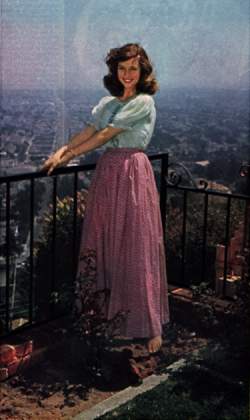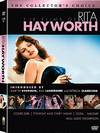





Cathy O'Donnell
Biography | Filmography | Articles | Bibliography | Downloads | Links | Image Credits | THE BEST YEARS OF OUR LIVES | BEN-HUR
| Article 1 |
Girl With a Poetic TouchBy Kyle CrichtonColliers Magazine, October 30, 1948 pages 71 and 83
Cathy O'Donnell trekked from Oklahoma to Hollywood to see David Selznick. But instead she got detoured to Sam Goldwyn who have her a lift to stardom. She finally met Selznick, following a friendship smashup that rocked the movie capital.On the afternoon of July 16, 1948, in the city of Hollywood, U.S.A., the professionally important cinematic idyl of Samuel Goldwyn and Cathy O'Donnell exploded with a detonation heard in parts of the Pacific Northwest. It ended a tutorial relationship as touching as the celebrated association of Abélard and Héloïse and was featured by letters, poetry and sage advice. Mr. Goldwyn had taken Miss O'Donnell as a young and unknown actress. Guided her as a novice and student, and finally launched her in The Best Years of Our Lives. That was followed by the creation of the new romantic acting team, Cathy O'Donnell and Farley Granger-- and now, to the amazement of the Western world, Cathy was leaving Goldwyn and going to Selznick. You could have knocked people down all over Hollywood with a club. The astonishment was greater by reason of They Live By Night, and O'Donnell-Granger venture made by RKO and a supercharged bundle of sadism, bank busting and vigor, neatly covered with a fine coating of young love. It was fondly predicted that this would stun America with delightfully devastating financial results. It had all started so simply. While still living in Oklahoma as Ann Steely (her real name) Cathy had sent a letter and picture to David O. Selznick. He had replied he would be glad to see her if she ever got to Hollywood. She did get to Hollywood and was interviewed by Selznick's casting director and a date was made for the great David to see her a week hence. In the meantime, while she was sitting demurely at Schwab's pharmacy absorbing a chocolate malted, Ben Medford, an agent, sidled up and said, "You ever been in movies?" Cathy looked at Mr. Medford with interest and said, "No, sir; I can't rightly say as how I have but I sure enough mean to be." These are not the exact words and are given merely to indicate that Cathy originally had an accent compounded of equal parts of Gullah and Lone Prairie, since she had lived in Alabama to the age of twelve and after that in Oklahoma City. Medford felt his way carefully through this miasma of sound and led her over to the Goldwyn offices. Mr. Goldwyn saw her immediately and decided to listen to her in a scene from Romeo and Juliet. After a few yards of what should have been golden Shakespearean strands, Sam looked around in befuddlement and said: "What's she sayin'?" This presented a pretty dilemma because if Sam didn't understand Cathy, Cathy didn't understand Sam, who talks in a strange way through his teeth. Sam, however, had the advantage of being in a position to state his case. He arranged for a screen test, then signed her to a contract before seeing it. What Sam saw in Cathy is still a mystery. She was an infant and not pretty in the Hollywood sense. Her accent was frightening. But Goldwyn takes pride in his clairvoyance and set out to prove he knew a future star when he saw one. He sent her over to the Pasadena Community Playhouse, where she acted in studio plays and studied diction under Natasha Lytess. Then he shipped her off to the American Academy of Dramatic Arts in New York. She lived at the Barbizon, a hotel for women, in New York, and had nothing to distract her. She cried a great deal during these months and relieved herself with a spate of poetry to send to Sam. Her poetry makes up the bulk of the famous O'Donnell-Goldwyn correspondence. Mr. Goldwyn said every time her poems were great and not to forget to wear her coat on autumn nights, which could be mighty cold at that season of the year in New York. After six months it was decided that Cathy should have acting experience, and it was discovered that the Goldwyn name was more potent in Hollywood than elsewhere. Even with letters from Miriam Howell, Goldwyn's representative in New York at the time Cathy had to make the customary rounds of casting offices. She finally got to Oscar Serlin, was hired for the second company of Life with Father, and toured the country after a run in Chicago. "Coy" Role Was Too BoringCathy got bored with the job and kept up a constant plea with Mr. Goldwyn to get her out of it. To make the case even stronger, she enclosed a poem each time. "I am getting more coy every performance," she wrote, "and I think it would be better if I got into You Touched Me, which is by Tennessee Williams and he is a very poetic man and I would like to work for him." She also wanted to change her name to "Lark." Mr. Goldwyn replied that her poems pleased him more each time but that "Lark" didn't really strike him favorably and she had better stick to Father. When the season ended she started looking for stage jobs again and was getting nowhere when Goldwyn recalled her to Hollywood for what turned out to be The Best Years of Our Lives. Cathy played the wife of the handless veteran, Harold Russell. She considers him one of the great characters in history. "I don't want to sound sappy," she says, "but he has a-- a saintlike quality. He must have been that way even before he lost his hands. Everybody who met him felt better about the world." When the picture was done Cathy O'Donnell went back to studying. Farley Granger returned from the wars, and he and Cathy read and rehearsed together, all part of the Goldwyn grooming of his new stars. The idea of teaming them in They Live By Night was Granger's and not Goldwyn's. Granger had the role and worked on it with Cathy as part of their study course. RKO had another girl in mind for the part and Granger did a screen test with her. He then suggested that they might like to try Cathy. "I had to pretend I'd never seen the script before," says Cathy. "I guess that wasn't quite accurate." Murder Finances HoneymoonThe plot concerns a young punk (Granger) who has broken out of prison with two older thugs and meets the girl (Cathy) in his travels. They fall in love, get married and hope for a better life-- but his ambitions in this regard are complicated by the fact that he engages in another bank hold-up and murder to get the money for his honeymoon. The remarkable thing is how the spectator acquires a rooting interest for the young man, although there is never any chance that fate will excuse him. He and Cathy strive desperately to hide away and enjoy their few weeks of happiness. The authorities close in on him and he is killed. It is strong, heart-warming fare despite the aura of murder, violence and waywardness. Despite her Irish name, Cathy is of French, English and German stock. Like so many Hollywood actresses she is the product of a divided family, her mother and father separating when she was quite young. Last April she eloped to Las Vegas, Nevada, with Robert Wyler, returned to Hollywood and spoke of an annulment, made up, separated and finally decided to make it work. Bulletins will be issued on this at intervals. No matter what happens she works on her acting and writes her poems. There is the threat that a book of these will be published in the near future but the effect on her acting career will probably be very slight. The number of movie-ticket buyers who read poetry is infinitesimal. What she brings to the screen is a quality of sincerity quite rare among the young beauties who labor in the cinematic factories. Goldwyn, who operated the famous Vilma Banky-Ronald Coleman team in the past, was guiding the O'Donnell-Granger duo with great astuteness when the blowup came. He was putting them into red-meat dramas far removed from the saccharine young love epics of yore. And now it is all over. Cathy finally got around to the interview with David Selznick that had been skipped years before and will be appearing in due course in The Greatest Show on Earth, a circus story utilizing the resources of Ringling Brothers and Barnum and Bailey, Inc. It was a great thing while it lasted. Cathy learned a lot from Goldwyn, and he learned something from Cathy. Sam learned a lot of poetry. © 1948 Colliers Magazine | |
|
Article 1 | Article
2 | Article 3 |
| Now in Print! |
|---|
| Now on DVD! |
|---|
Buy Videos & DVDs |
|
Buy Movie Posters |
|
Buy Movie Posters |
|
Classic
Movie Merchandise |
|
![]() Printer-friendly version.
Printer-friendly version.
![]() Return
to the top.
Return
to the top.
Last updated:
March 10, 2011.
Reel Classics is a registered trademark of Reel Classics, L.L.C.
© 1997-2011 Reel Classics, L.L.C. All rights reserved. No
copyright is claimed on non-original or licensed material.
Terms of
Use.










